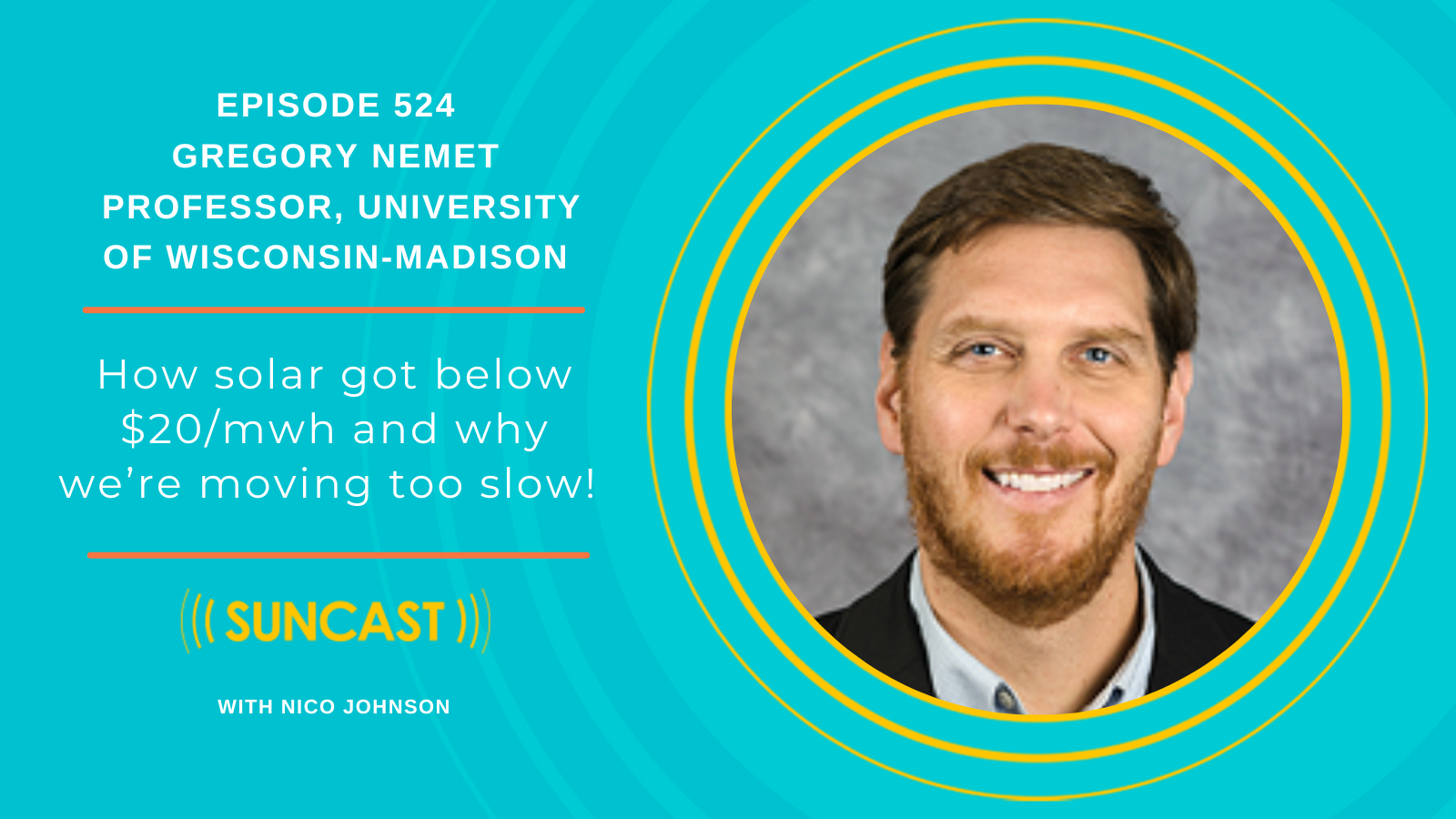We'd love if you'd leave us a 5 ⭐ rating & review and it's never been easier: www.ratethispodcast.com/suncast
Gregory Nemet went to grad school to understand how to stimulate energy-related innovation. Twenty years later, he remains convinced the success of a niche solution like solar could be a catalyst for innovation around the massive problem of climate change.
Gregory is an author and a professor at the University of Wisconsin–Madison's La Follette School of Public Affairs, where he teaches courses in energy systems analysis, policy analysis, and international environmental policy. His research focuses on understanding the process of technological change and how public policy can affect it.
Today's Tactical Tuesday explores takeaways from Gregory's decades of research to understand how solar prices dropped dramatically and spurred an energy revolution.
He majored in geography with economics at Dartmouth College, where he took energy and meteorology courses that included climate change. "I worked in the private sector for seven years," he recalled, comparing innovation in consumer products, IT, healthcare, and energy.
"Energy was lower by every measure, and we looked at research and development spending, patenting, and employment of scientists and engineers. So I went to grad school to work on the question of stimulating energy innovation," he said.
"Once I got there, one of the technologies I looked at was changing the most: solar. It was on the margins and had these elegant physics behind it. But it had always been an interesting novelty, definitely not something that would be serious for dealing with energy problems. Because energy problems are big — climate change is a big problem, and you can't do something small to deal with a big problem.
"And that turned out to be exactly the wrong advice and knowledge, and that changed my thinking that small technologies might be better at going big than the big ones," he said.
Gregory earned two advanced degrees in energy and resources from the University of California, Berkeley — a master's in 2004 and a doctorate in 2007. They set the stage for an academic career and a focus that has endured the past 15 years on how solar became inexpensive.
Gregory joined UW–Madison as an assistant professor in 2007. From 2013-18 he chaired the institution's Energy Analysis and Policy certificate program, and in 2015, he received the H.I. Romnes Faculty Fellowship for outstanding research contributions.
He was named an Andrew Carnegie Fellow in 2017, which particularly calls to me as I'm a big fan of Andrew Carnegie. The Andrew Carnegie Fellows Program supports high-caliber scholarship in the social sciences and humanities that ideally results in the publication of a book or major study.
Gregory turned his research into his first book, How Solar Became Cheap: A Model for Low-Carbon Innovation. Published in June 2019, it makes the case that other low-carbon technologies with similar properties can benefit by understanding the drivers behind solar energy's success.
"The first thing I always tell people, probably more outside the solar industry, but even inside, is how cheap solar is today and then how far it's come. It's been a factor of 10,000 from the first commercial sale of a solar system on a satellite in 1958, when it was $300,000 per megawatt hour, to today, where we have power purchase agreements below $20 per megawatt hour," he said. "And so how did that happen?"
First, no country maintained its technological lead for more than a few years, and no company that was the world's most prominent solar producer retained the title. "The US created the technology, Germany developed a market, and the Chinese made it cheap. And it was that sequence that worked so well," he said.
It was people, capital, knowledge and production moving around the world. "It was cells made in one place being put into modules in another place and installed in houses in centralized locations and other places. So those international flows are absolutely crucial," he explained.
But it all went too slowly — a critical lesson he suggests we should extrapolate to climate mitigation innovation. "The real question now is how do we go faster?" he said.
I asked Gregory to identify the properties and technologies on the edge of decarbonization that he believes hold the most promise in applying these learnings. He said he's drawn to innovation around production technology rather than design technology. "That seems interesting, and the real crucial connector is iterations," he said.
"If you make many of the same or slightly different things, you can learn to apply new technologies and techniques and figure out how to do it better."
Technologies that involve many repetitive tasks can incrementally improve. "That's why batteries for electric vehicles look almost exactly like the solar playbook. And for nearly the same reasons, they've come down in cost.
"Looking forward, think about other small-scale distributed technologies with massive iterations. Those are ones where you could learn from solar," Gregory said.
Want examples? In addition to batteries for electric vehicles, think LED lighting and heat pumps. "The other area where it's more of an open question, but potentially really interesting, is removing CO2 that's already in the atmosphere because we probably will need to do some of that. Could you do direct air capture with a small-scale approach like solar, and some companies are trying to do that," he said. "We'll see if the playbook works well for them."
Gregory explores multiple critical issues in today's podcast, including the changing global economic landscape and the limitations of the Biden Administration's executive orders to drive climate action.
He considers whether innovation could stall and prices rise if domestic production eliminates the importation of inexpensive Chinese technologies — and he warns the United States will need legislation within two to four years to maintain its climate mitigation momentum.
We also dive into his work as a lead author for the Intergovernmental Panel on Climate Change's (IPCC) 6th Assessment Report (AR6). While there is good news — the cost of solar is falling as adoption climbs. But he acknowledges that "almost everything else in the report is bad news about emissions continuing to rise."
TIMESTAMPS:
0:36 Introduction
3:30 Why Greg choose the solar industry as a central focus
5:54 Some of the thesis on how solar became inexpensive
8:35 Technologies on the edge of decarbonization
10:14 Examples of small scale distributed technology
12:00 How changing global economic landscape affect climate change
16:12 Advice to policymakers about robust market options
20:27 States that are winners in terms of policy change
22:41 Creating alliances with vector like glass & steel
25:05 Thoughts on IPCC report & takeaways
27:27 Where to find Dr. Gregory Nemet
27:51 Wrap up
RESOURCES:
Connect with Gregory Nemet on LinkedIn and his website.
University of Wisconsin-Madison website
BOOKS MENTIONED AND RECOMMENDATIONS:
NOTEWORTHY QUOTES:
“If you make many of the same or slightly different things, you can learn to apply new technologies and techniques and figure out how to do it better.”
Thanks again to this week's sponsor, helping keep the podcast FREE to you!
SUNGROW focuses on integrated energy storage system solutions, including PCS, lithium-ion batteries and energy management system. Pleae visit https://www.mysuncast.com/sungrow
ABOUT THE HOST OF SUNCAST:
Nico Johnson is the creator and host of SunCast, consistently rated a top solar podcast in the clean energy sector. The content of the show is geared towards listeners looking for insights on where the markets are headed, how to position themselves or their companies, and what today's market leaders do to stay ahead of the pack.
Nico is an Investor, Executive Coach, and 16-year veteran of the solar industry, having led development in the US and Latin America for global companies like Trina Solar and Conergy.
You can connect with Nico Johnson on Twitter, LinkedIn or email.
If you’ve been second-guessing your work decisions or maybe trying to reconsider how you "fit" in the renewable energy industry -> grab 20 minutes on Nico's calendar and discuss whether having him as Your personal coach might be the right next step.



